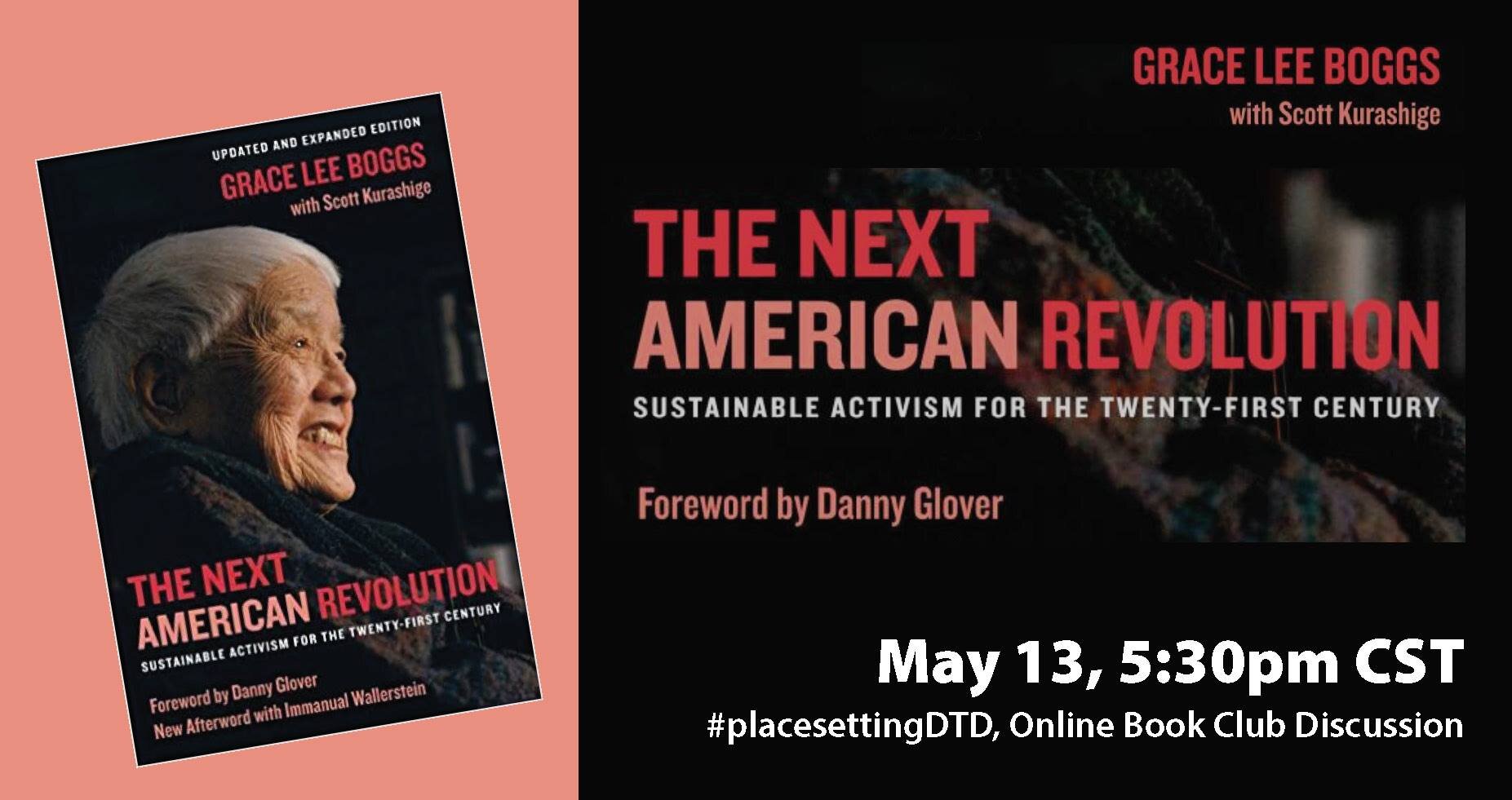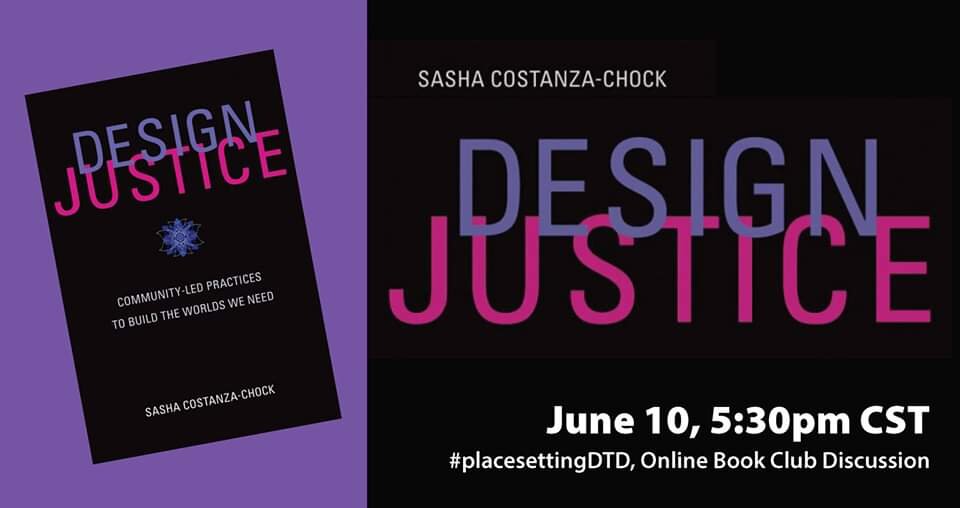One of the projects that we have been excited about for this Spring is Place Setting, a collaboration between [bc], Sunset Arts Studios, and Downtown Dallas, Inc. Part of the goal of Place Setting is to consider what it means to come together in public space, how do we envision and create radically inclusive places that facilitate and support equitable communities. While we can't physically be together right now, the question of how we come together has taken on a new meaning in this time of social distancing, and yielded a new question of what does it mean to physically be together when this is all over. The deep injustices in our country, and across the globe, are more visible than ever - how do we organize to understand the roots of this injustice, to imagine new models of working, living, and being together?
A book club was planned as part of our in-person programming as a way to discuss ideas of design, justice, equity, and community, supporting our other action oriented programming with artists and partners. Since we can’t meet in person, we’ve decided to move the book club online, in partnership with local bookstore and publisher Deep Vellum.
May Book Club: The Next American Revolution by Grace Lee Biggs
May 13, 5:30 (co-author in attendance)
The Next American Revolution was listed by Next City as one of the top ten books for urbanists on cities, race, and public space. Author Grace Lee Boggs "is a longtime social justice advocate and philosopher who has had her heels dug into just about every major American revolution of the last 75 years, from labor to women’s rights to environmentalism. This is the book where she synthesizes it all. She asks us to welcome change in our cities as an invitation to wholly re-imagine our ideas of community and citizenship. We can do better, she argues, and alternative models for how we humans can organize ourselves are already happening. This is a rousing call for a mass model of leadership, reflection and critical thinking that seeks a way to make the wisest civic choices. Pair this book with the PBS film American Revolutionary: The Evolution of Grace Lee Boggs." https://nextcity.org/daily/entry/books-recommended-race-cities-public-space
About Co-Author Dr. Scott Kurashige
Scott Kurashige is professor of American culture, history, and Afroamerican & African Studies at the University of Michigan. He is the author of The Shifting Grounds of Race: Black and Japanese Americans in the Making of Multiethnic Los Angeles (Princeton University Press, 2008), which received the American Historical Association’s 2008 Albert J. Beveridge Award “for the best book in English on the history of the United States, Latin America, or Canada from 1492 to the present.” He is also co-author of Grace Lee Boggs' The Next American Revolution: Sustainable Activism for the Twenty-First Century (University of California Press, 2011). He has over twenty years of experience as a grassroots activist and is a board member of the James and Grace Lee Boggs Center to Nurture Community Leadership based in Detroit, Michigan.
June Book Club: Design Justice by Sasha Costanza-Chock
June 10, 5:30 (author will attend)
"What is the relationship between design, power, and social justice? “Design justice” is an approach to design that is led by marginalized communities and that aims explicitly to challenge, rather than reproduce, structural inequalities. It has emerged from a growing community of designers in various fields who work closely with social movements and community-based organizations around the world.
This book explores the theory and practice of design justice, demonstrates how universalist design principles and practices erase certain groups of people—specifically, those who are intersectionally disadvantaged or multiply burdened under the matrix of domination (white supremacist heteropatriarchy, ableism, capitalism, and settler colonialism)—and invites readers to “build a better world, a world where many worlds fit; linked worlds of collective liberation and ecological sustainability.” Along the way, the book documents a multitude of real-world community-led design practices, each grounded in a particular social movement. Design Justice goes beyond recent calls for design for good, user-centered design, and employment diversity in the technology and design professions; it connects design to larger struggles for collective liberation and ecological survival." https://mitpress.mit.edu/books/design-justice
Sasha Costanza Chock
About the Author, Sasha Costanza Chock
Sasha Costanza-Chock (pronouns: they/them or she/her) is a researcher, designer, educator, and media-maker whose work focuses on networked social movements, transformative media organizing, and design justice. They are currently Associate Professor of Civic Media at MIT and Faculty Associate at the Berkman-Klein Center for Internet & Society at Harvard University. Their new book, Design Justice: Community-Led Practices to Build the Worlds We Need, was published by the MIT Press in 2020. Sasha is a board member of Allied Media Projects (alliedmedia.org) and a Steering Committee member of the Design Justice Network (designjustice.org).
July Book Club: White Metropolis by Michael Phillips
July 15, 5:30
"Exploring more than 150 years of Dallas history, Phillips reveals how white business leaders created both a white racial identity and a Southwestern regional identity that excluded African Americans from power and required Mexican Americans and Jews to adopt Anglo-Saxon norms to achieve what limited positions of power they held. He also demonstrates how the concept of whiteness kept these groups from allying with each other, and with working- and middle-class whites, to build a greater power base and end elite control of the city. Comparing the Dallas racial experience with that of Houston and Atlanta, Phillips identifies how Dallas fits into regional patterns of race relations and illuminates the unique forces that have kept its racial history hidden until the publication of this book." https://utpress.utexas.edu/books/phiwhi
![[bc]](http://images.squarespace-cdn.com/content/v1/5248ebd5e4b0240948a6ceff/1412268209242-TTW0GOFNZPDW9PV7QFXD/bcW_square+big.jpg?format=1000w)





